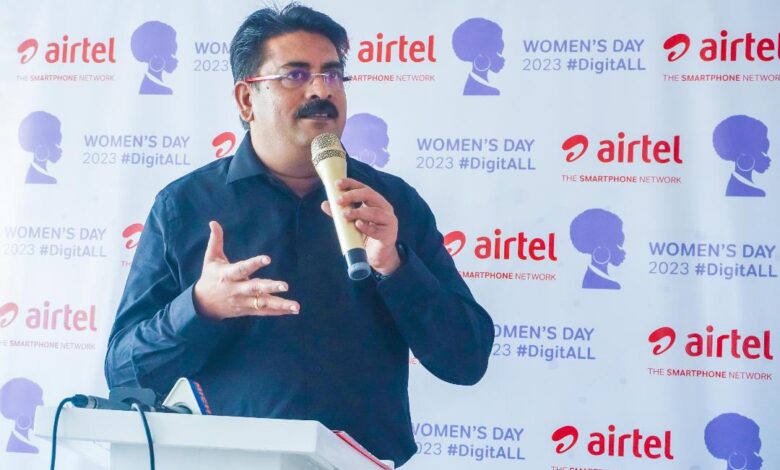Technology
NCC Warns Nigerians About New Smartphone Attacking Virus

By Adedapo Adesanya
The Nigerian Communications Commission (NCC) has alerted telecom consumers and the general public that a new Android malware named ‘AbstractEmu’, had been discovered.
NCC said the malware can gain access to smartphones, take complete control of infected smartphones and silently modify device settings while simultaneously taking steps to evade detection.
This discovery was announced recently by the Nigerian Computer Emergency Response Team (ngCERT), the national agency established by the Federal Government to manage the risks of cyber threats in Nigeria, which also coordinates incident response and mitigation strategies to proactively prevent cyber-attacks against Nigeria.
“AbstractEmu has been found to be distributed via Google Play Store and third-party stores such as the Amazon Appstore and the Samsung Galaxy Store, as well as other lesser-known marketplaces like Aptoide and APKPure,” the report said.
The advisory stated that a total of 19 Android applications that posed as utility apps and system tools like password managers, money managers, app launchers, and data saving apps have been reported to contain the rooting functionality of the malware.
The apps are said to have been prominently distributed via third-party stores such as the Amazon Appstore and the Samsung Galaxy Store, as well as other lesser-known marketplaces like Aptoide and APKPure. The apps include All Passwords, Anti-ads Browser, Data Saver, Lite Launcher, My Phone, Night Light and Phone Plus, among others.
According to the report, rooting malware although rare, is very dangerous. By using the rooting process to gain privileged access to the Android operating system, the threat actor can silently grant itself dangerous permissions or install additional malware – steps that would normally require user interaction. Elevated privileges also give the malware access to other apps’ sensitive data, something not possible under normal circumstances.
The ngCERT advisory also captured the consequences of making their devices susceptible to AbstractEmu attacks. Once installed, the attack chain is designed to leverage one of five exploits for older Android security flaws that would allow it to gain root permissions. It also takes over the device, installs additional malware, extracts sensitive data, and transmits to a remote attack-controlled server.
Additionally, the malware can modify the phone settings to give the app ability to reset the device password, or lock the device, through device admin; draw over other windows; install other packages; access accessibility services; ignore battery optimisation; monitor notifications; capture screenshots; record device screen; disable Google Play Protect; as well as modify permissions that grant access to contacts, call logs, Short Messaging Service (SMS), Geographic Positioning System (GPS), camera, and microphone.
The ngCERT also asserts in the advisory that, while the malicious apps were removed from Google Play Store, the other app stores are likely distributing them. Consequently, the NCC wishes to reiterate a two-fold ngCERT advisory in order to mitigate the risks. The two-fold advisory include:
- Users should be wary of installing unknown or unusual apps, and look out for different behaviours as they use their phones.
2. Reset your phone to factory settings when there is suspicion of unusual behaviours in your phone.
The NCC, in the exercise of its mandate and obligation to the consumers, said it “will continue to sensitise and educate telecoms consumers on any cyber threat capable of inflicting low or high-impact harms on their devices, whether discovered through the ngCERT or the telecom sector’s Centre for Computer Security Incident Response managed by the Commission.”
Business Post had earlier reported that the commission had warned telecom consumers of the existence of new, high-risk and extremely damaging, Android device-targeting Malware called Flubot and outlined steps to prevent the eir devices from being attacked by the virus.
Technology
Leticia Otomewo Becomes Secure Electronic Technology’s Acting Secretary

By Aduragbemi Omiyale
One of the players in the Nigerian gaming industry, Secure Electronic Technology (SET) Plc, has appointed Ms Leticia Otomewo as its acting secretary.
This followed the expiration of the company’s service contract with the former occupier of the seat, Ms Irene Attoe, on January 31, 2026.
A statement to the Nigerian Exchange (NGX) Limited on Thursday said Ms Otomewo would remain the organisation’s scribe in an acting capacity, pending the ratification and appointment of a substantive company secretary at the next board meeting.
She was described in the notice signed by the Managing Director of the firm, Mr Oyeyemi Olusoji, as “a results-driven executive with 22 years of experience in driving business growth, leading high-performing teams, and delivering innovative solutions.”
The acting secretary is also said to be “a collaborative leader with a passion for mentoring and developing talent.”
“The company assures the investing public that all Company Secretariat responsibilities and regulatory obligations will continue to be discharged in full compliance with the Companies and Allied Matters Act, applicable regulations, and the Nigerian Exchange Limited Listing Rules,” the disclosure assured.
Meanwhile, the board thanked Ms Attoe “for professionalism and contributions to the Company during the period of her engagement and wishes her well in her future endeavours.”
Technology
Russia Blocks WhatsApp Messaging Service

By Adedapo Adesanya
The Russian government on Thursday confirmed it has blocked the WhatsApp messaging service, as it moves to further control information flow in the country.
It urged Russians to use a new state-backed platform called Max instead of the Meta-owned service.
WhatsApp issued a statement earlier saying Russia had attempted to “fully block” its messaging service in the country to force people toward Max, which it described as a “surveillance app.”
“Today the Russian government attempted to fully block WhatsApp in an effort to drive people to a state-owned surveillance app,” WhatsApp posted on social media platform X.
“Trying to isolate over 100 million users from private and secure communication is a backwards step and can only lead to less safety for people in Russia,” it said, adding: “We continue to do everything we can to keep users connected.”
Russia’s latest move against social media platforms and messaging services like WhatsApp, Signal and Telegram comes amid a wider attempt to drive users toward domestic and more easily controlled and monitored services, such as Max.
Russia’s telecoms watchdog, Roskomnadzor, has accused messaging apps Telegram and WhatsApp of failing to comply with Russian legislation requiring companies to store Russian users’ data inside the country, and of failing to introduce measures to stop their platforms from being used for allegedly criminal or terrorist purposes.
It has used this as a basis for slowing down or blocking their operations, with restrictions coming into force since last year.
For Telegram, it may be next, but so far the Russian government has been admittedly slowing down its operations “due to the fact that the company isn’t complying with the requirements of Russian legislation.”
The chat service, founded by Russian developers but headquartered in Dubai, has been a principal target for Roskomnadzor’s scrutiny and increasing restrictions, with users reporting sluggish performance on the app since January.
Technology
Nigerian AI Startup Decide Ranks Fourth Globally for Spreadsheet Accuracy

By Adedapo Adesanya
Nigerian startup, Decide, has emerged as the fourth most accurate Artificial Intelligence (AI) agent for spreadsheet tasks globally, according to results from SpreadsheetBench, a widely referenced benchmark for evaluating AI performance on real-world spreadsheet problems.
According to the founder, Mr Abiodun Adetona, the ranking places Decide alongside well-funded global AI startups, including Microsoft, OpenAI, and Anthropic.
Mr Adetona, an ex-Flutterwave developer, also revealed that Decide now has over 3,000 users, including some who are paying customers, a signal to the ability of the startup to scale in the near future.
SpreadsheetBench is a comprehensive evaluation framework designed to push Large Language Models (LLMs) to their limits in understanding and manipulating spreadsheet data. While many benchmarks focus on simple table QA, SpreadsheetBench treats a spreadsheet as a complex ecosystem involving spatial layouts, formulas, and multi-step reasoning. So far, only three agents rank higher than Decide, namely Nobie Agent, Shortcut.ai, and Qingqiu Agent.
Mr Adetona said SpreadsheetBench measures how well AI agents can handle practical spreadsheet tasks such as writing formulas, cleaning messy data, working across multiple sheets, and reasoning through complex Excel workflows. Decide recorded an 82.5% accuracy score, solving 330 out of 400 verified tasks.
“The result reflects sustained investment in applied research, product iteration, and learning from real-world spreadsheet workloads across a wide range of use cases,” Mr Adetona told Business Post.
For Mr Adetona, who built Decide out of frustration with how much time professionals spend manually cleaning data, debugging formulas, and moving between sheets, “This milestone highlights how focused engineering and domain-specific AI development can deliver frontier-level performance outside of large research organisations. By concentrating on practical business data problems and building systems grounded in real user environments, we believe smaller teams can contribute meaningfully to advancing applied AI.”
“For Decide, this is a foundation for continued progress in intelligent spreadsheet and analytics automation,” he added.
-

 Feature/OPED6 years ago
Feature/OPED6 years agoDavos was Different this year
-
Travel/Tourism10 years ago
Lagos Seals Western Lodge Hotel In Ikorodu
-

 Showbiz3 years ago
Showbiz3 years agoEstranged Lover Releases Videos of Empress Njamah Bathing
-

 Banking8 years ago
Banking8 years agoSort Codes of GTBank Branches in Nigeria
-

 Economy3 years ago
Economy3 years agoSubsidy Removal: CNG at N130 Per Litre Cheaper Than Petrol—IPMAN
-

 Banking3 years ago
Banking3 years agoSort Codes of UBA Branches in Nigeria
-

 Banking3 years ago
Banking3 years agoFirst Bank Announces Planned Downtime
-

 Sports3 years ago
Sports3 years agoHighest Paid Nigerian Footballer – How Much Do Nigerian Footballers Earn

















